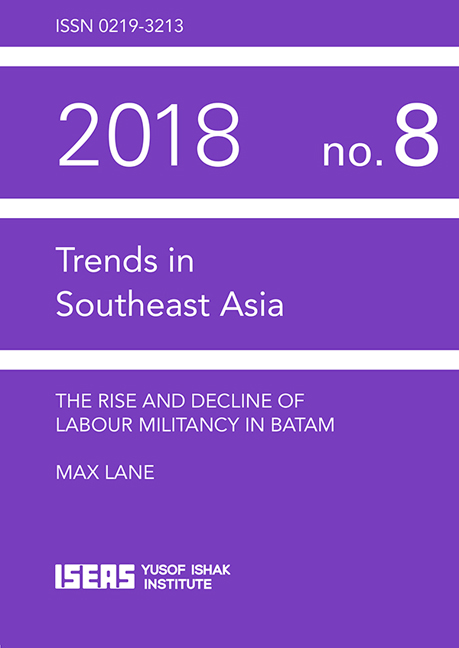The Rise and Decline of Labour Militancy in Batam
Published online by Cambridge University Press: 12 February 2019
Summary
EXECUTIVE SUMMARY
• Over the past two decades, trade union activity in Batam has been heavily influenced by regional demographics, employment conditions and the prevalent political scenario.
• Following the end of the New Order in 1998, the single state-authorized union was fragmented, giving rise to a number of new enterprise unions. Batam's young and diverse immigrant population, with no pre-existing loyalties to particular trade unions, made it a hotspot for industrial relations activities.
• Low and stagnant workers’ wages throughout Indonesia and outbreak of social unrest resulted in the formation of three strong national-level unions: FSPMI, KSPSI and the KSBSI. By the mid-2000s, these unions were also active in Batam.
• Unsettled ethnic relations resulted in escalation of labour mobilizations from 2011 to 2013. The Garda Metal (union member formation) spearheaded a number of intense demonstrations throughout Indonesia, including Batam, during this time.
• The 2012 mobilization was particularly effective, and the union bodies were able to successfully negotiate for significantly higher minimum wages for all workers in Indonesia.
• After intervention by the Widodo government, and the signing of a harmony declaration, there has been a change in the unions’ approach in demanding wages and conditions improvement. Instead of addressing employment concerns through national-level campaigns, matters are now to be resolved at the enterprise level.
• While there are no visible signs of a confrontational mobilization in the near future, a number of worker welfare issues remain unsettled.
- Type
- Chapter
- Information
- The Rise and Decline of Labour Militancy in Batam , pp. vii - viiiPublisher: ISEAS–Yusof Ishak InstitutePrint publication year: 2018



